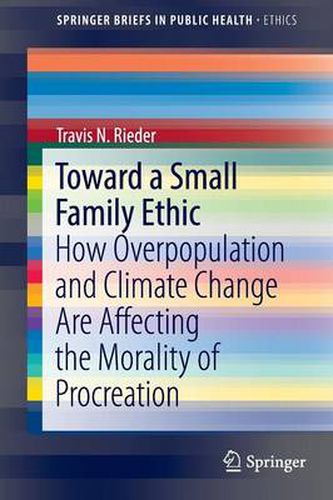Readings Newsletter
Become a Readings Member to make your shopping experience even easier.
Sign in or sign up for free!
You’re not far away from qualifying for FREE standard shipping within Australia
You’ve qualified for FREE standard shipping within Australia
The cart is loading…






This title is printed to order. This book may have been self-published. If so, we cannot guarantee the quality of the content. In the main most books will have gone through the editing process however some may not. We therefore suggest that you be aware of this before ordering this book. If in doubt check either the author or publisher’s details as we are unable to accept any returns unless they are faulty. Please contact us if you have any questions.
This thought-provoking treatise argues that current human fertility rates are fueling a public health crisis that is at once local and global. Its analysis and data summarize the ecological costs of having children, presenting ethical dilemmas for prospective parents in an era of competition for scarce resources, huge disparities of wealth and poverty, and unsustainable practices putting irreparable stress on the planet. Questions of individual responsibility and integrity as well as personal moral and procreative issues are examined carefully against larger and more long-range concerns. The author’s assertion that even modest efforts toward reducing global fertility rates would help curb carbon emissions, slow rising global temperatures, and forestall large-scale climate disaster is well reasoned and more than plausible.
Among the topics covered:
*
The multiplier effect: food, water, energy, and climate. *
The role of population in mitigating climate change.
*
The carbon legacy of procreation.
*
Obligations to our possible children.
*
Rights, what is right, and the right to do wrong.
*
The moral burden to have small families.
Toward a Small Family Ethic sounds a clarion call for bioethics students and working bioethicists. This brief, thought-rich volume steers readers toward challenges that need to be met, and consequences that will need to be addressed if they are not.
$9.00 standard shipping within Australia
FREE standard shipping within Australia for orders over $100.00
Express & International shipping calculated at checkout
This title is printed to order. This book may have been self-published. If so, we cannot guarantee the quality of the content. In the main most books will have gone through the editing process however some may not. We therefore suggest that you be aware of this before ordering this book. If in doubt check either the author or publisher’s details as we are unable to accept any returns unless they are faulty. Please contact us if you have any questions.
This thought-provoking treatise argues that current human fertility rates are fueling a public health crisis that is at once local and global. Its analysis and data summarize the ecological costs of having children, presenting ethical dilemmas for prospective parents in an era of competition for scarce resources, huge disparities of wealth and poverty, and unsustainable practices putting irreparable stress on the planet. Questions of individual responsibility and integrity as well as personal moral and procreative issues are examined carefully against larger and more long-range concerns. The author’s assertion that even modest efforts toward reducing global fertility rates would help curb carbon emissions, slow rising global temperatures, and forestall large-scale climate disaster is well reasoned and more than plausible.
Among the topics covered:
*
The multiplier effect: food, water, energy, and climate. *
The role of population in mitigating climate change.
*
The carbon legacy of procreation.
*
Obligations to our possible children.
*
Rights, what is right, and the right to do wrong.
*
The moral burden to have small families.
Toward a Small Family Ethic sounds a clarion call for bioethics students and working bioethicists. This brief, thought-rich volume steers readers toward challenges that need to be met, and consequences that will need to be addressed if they are not.